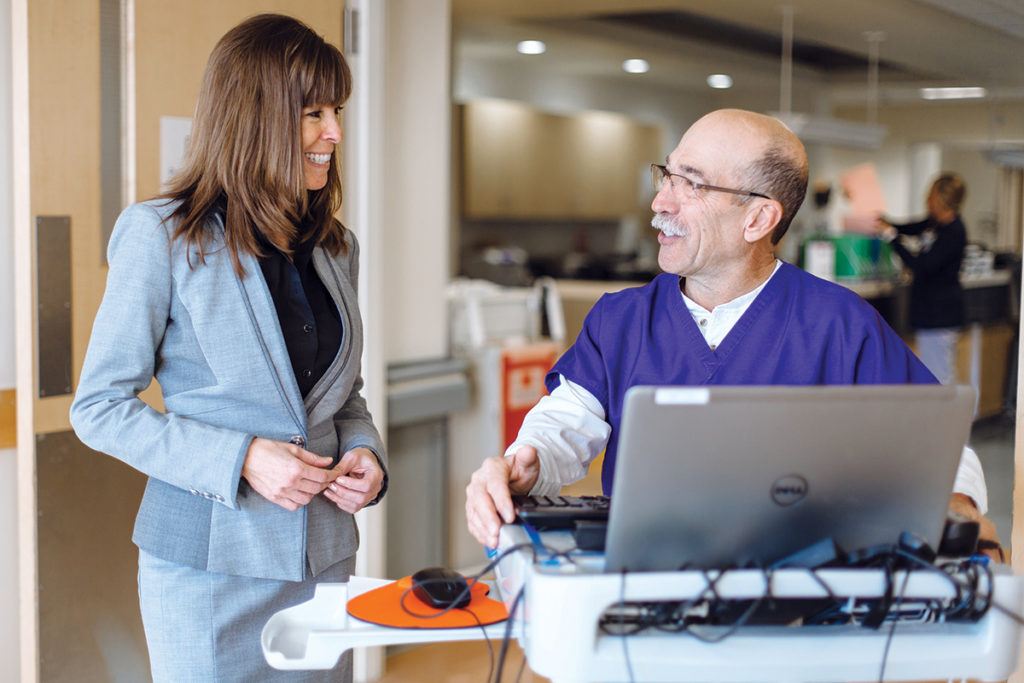As the senior vice president of human resources at Lifespan Corp., Lisa Abbott oversees strategy and operations, especially in relation to customer-service excellence and operational efficiency.
Appointed in March 2016, she’s committed to maintaining Lifespan’s position as the largest Rhode Island employer and creating a reputation for the company as a deliverer of “health with care.”
Is Rhode Island a good place to grow jobs? Why? It’s a great place to grow jobs. … When I moved here I came by way of New York and Pennsylvania, both states where there was less direct, hands-on influence by the government. Here it’s different, it has its pros and its cons, but in the case of growing jobs I think Gov. [Gina M.] Raimondo makes her agenda very clear.
If government could do one thing to help businesses grow jobs, what would it be and why? For Lifespan, particularly, it would be helpful to recognize that decisions about the state budget have a direct impact on [the company]. We want to be that pillar in the community, [yet] when we’re 60 percent government-funded that’s a sensitivity that is a key performance indicator for our ability to be a stable employer in this state.
What’s the most important attribute a business leader needs to grow their business/add jobs? I would say to any leader: Know the culture you want to create, know the business you’re in and make sure the talent you’re aligning to work in your organization understands what the culture is going to be and why it matters in terms of, in our circumstance, patient outcomes. … We want to deliver health with care and need individuals who work at all levels of our organization who understand our values of compassion, accountability, respect and excellence.
In which industry do you see the greatest potential for job growth in Rhode Island and why? It’s health care. … We’ve done a lot of diligence in terms of managing our budgets and being extremely fiduciarily responsible and find ourselves in a great position to support things [such as] the closure of Memorial Hospital – if that goes through. I see us as a competitor for talent here.
We’re always going to be in somewhat of a war for talent, but to make Rhode Island an attractive place to work and live we want to be thinking about synergistic opportunities with [companies such as CVS Health]. As health care continues to take shape in the New England market, that will help influence the direction of job growth.
JOBS
2016: 12,050
2017: 12,363
What’s the baseline you’re looking for, the key factors in the talent you want to grow Lifespan? I talk a lot to emerging college students about the silver bullet to landing a job and I say, “Learn how to make eye contact, get off your device.” … We want people who are keen, avid learners and that’s why our pipeline programs are so important. The talent we’re cultivating in those programs are people who want to be actively engaged in our workplace.
We can train you to do, we can’t train you how to be.
You most recently worked with Penn State Hershey Medical Center in Hershey, Pa. With this regional experience, what do you think are the biggest challenges facing the health care industry when it comes to job creation? Regionally, we’re in tough competition with the Boston market, but nationally, with the mergers and acquisitions of some health care systems … there are different kinds of job impact.
Nationally, [the industry has] a lot of what I would call churn – people who move through the system but not an inordinate amount of turnover. … [Lifespan has] been lucky. We are growing because [regional] patients [vote] with their feet. … Because of the less-fortunate circumstances of other regional health care systems, we are seeing volume … which requires us to be responsive. Part of that response is to grow patient-facing jobs [and] … we are extraordinarily precise when we add jobs in response to direct patient-care demand.
We’re working with Rhode Island College and University of Rhode Island’s reputable and strong nursing programs to be sure they understand there is a place and a career here for those [graduates].
Do you feel Lifespan has a responsibility in terms of inspiring other Rhode Island-based companies to create jobs in lean times? We have a huge responsibility as the largest employer in the state and an employer who happens to be very stable right now. We would love nothing else than to lead by example and invest in these talent-pipeline programs.
Our Community Health Institute is representative of what we have to offer. We’re out there with lifestyle education strategies … teaching community members how to cook a healthy meal on a very modest budget. We’ve just resurrected what we’re calling Team Lifespan – our externally facing arm sponsoring and participating in races that are aligned with our core missions. Through the next year, you’ll see Team Lifespan in volunteer activity at Crossroads Rhode Island [and for other causes].
When does Lifespan decide to make a hire, rather than continue to tweak processes? Believe me when I tell you, we exhaust every possibility before we hire additional people. We never want to be in the unenviable position of reducing jobs.
We can all stand to improve processes. [Yet] when we’re growing by the proportion that we’re growing, process improvement only goes so far and we need more people, otherwise we cannot deliver extraordinary patient care – at the bedside, in support services and places in between.
What do you find is the top priority for the prospective employee in the 21st-century workplace? We are a multigenerational workforce [employing] five generations – we’ve got people who have been here for 45 and 50 years and we’ve got people who have been here for four or five minutes – whose needs are very different.
In the last 12 months we’ve [identified] what works in our benefit portfolio and what doesn’t. We use the jargon “contemporary, competitive and cost-effective” and made significant changes to our retirement-plan strategy that are as contemporary as you can get.
We’re in conversations with a group that works on pathway programs to forgive student loans. If you’ve been in public service or a nonprofit job [and] you’ve made consistent payments for some period of time, there’s an opportunity to apply for some student-loan forgiveness.
[caption id="attachment_188915" align="aligncenter" width="640"]

ACTIVELY ENGAGED: Lisa Abbott, senior vice president of human resources at Lifespan Corp., speaks with Jerry Quaranto, licensed practical nurse. / PBN PHOTO/
RUPERT WHITELEY[/caption]
How do you work with employees to be the place people want to work and attract the right talent? It’s hard. … Something we’re looking at as the next phase of benefit modernization [is] voluntary benefits. It means access to child care and elder care, pet insurance – perks.
Millennials want flexibility, perks and to grow, so we need pathway programs supported by a portfolio of benefits that are material.
Pet insurance is definitely something fun that gets people hooked, but is that what you want to spend your time on? It’s not a matter of what I want to spend my time on, it’s a matter of what I must spend my time on … to be competitive in this industry.
Lifespan had some difficult times in the downturn of the economy and there were a lot of takeaways. … People ask about your 401(k) and your match and, before now, we couldn’t respond favorably to that.
Do you think Lifespan stands out as an organization willing to offer those razzle dazzle, new benefits? This is all really new and I get a little nervous around razzle dazzle, because that maybe implies frivolity. [We’re] being good fiduciaries of the dollars we have and spending them in the smartest way.
We’re on a campaign to roll some of these changes forward and … voluntary benefits are the next stage.
How does Rhode Island’s health care employment market compare to Boston? Graduates want to work in a big city and Providence is making its way onto the market as a cool city.
We’re competing with the glitz and glam, especially with emerging workers. The cost of living is much more reasonable than in Boston, if you have your choice to go anywhere and you get paid top dollar, people don’t always look at the total cost of that transaction. Maybe you get paid a little bit more, but it costs you a lot more [to live in expensive cities].
In the Boston market, there’s a lot more geographically concentrated competition. If you look at the academic health centers and the hospitals, they’re all doing reasonably well – down here, not so much. … There has been a lot of shuffling and reshuffling in the Rhode Island health care industry this year. Will the consolidation – the possible loss of Care New England and the shuttering of Memorial Hospital – negatively impact health care job growth in Rhode Island?
We’re going to grow somewhere between 300 and 400 jobs in 2018 because of the [patient] volume. Our strategy is to keep our heads down and focus on what we know right now.
Will Lifespan absorb employees laid off by the closure of Memorial Hospital, as suggested by Gov. Raimondo? We’re already working on it. We’ve got a dozen people in the pipeline and went to Memorial [in November] for an on-site job fair, actively working to place the right people in the right jobs.
A Lifespan spokesperson said former Memorial employees would be given “priority review” – what does that entail? We solicited our applicant-tracking database to find the people from Memorial … and we were able to reach 35 percent or 40 percent of those people – there are some people that will retire.
[In November], we brought hiring managers to [the hospital] for targeted matching in the hopes of making on-the-spot job offers.













